7 Examples of AI in Law Firms Improving Daily Practice
7 Examples of AI in Law Firms Improving Daily Practice
Walk into almost any law office today and you’ll see the same picture: stacks of documents, full inboxes, and lawyers who spend as much time preparing work as they do practicing law.
The legal profession has always balanced expertise with process, but the process side often wins the battle for time.
Today, however, artificial intelligence (AI) is quietly reshaping the workflow. Not with flashy promises, but with practical support that trims hours off the parts of the job no one went to law school for.
And the firms leaning into these tools aren’t chasing a trend. They’re making a trade: fewer late nights buried in paperwork, more focus on strategy, clients, and the details that decide outcomes.
In the sections ahead, we’ll look at how law firms are putting AI to work, the tasks it’s taking off lawyers’ plates, and the tools that are shaping daily practice in 2026.
How Are Law Firms Using AI?
According to the Federal Bar Association’s Legal Industry Report, about 31% of legal professionals said they personally used generative AI at work in 2024, and 21% reported firm‑wide implementation of legal-specific AI tools.
That tells you something. Many attorneys are already using AI in their day-to-day work, while firm-wide adoption is still catching up. Why? Often, firms are building trust, setting policies, and choosing tools that fit their workflows before rolling out broadly.
Here’s how AI is helping those who use it:
- Drafting letters or emails: AI takes the load off routine writing.
- Research and summarization: It pulls up relevant case law or condenses documents fast.
- Contract review: AI flags unusual or risky terms in long agreements.
- Client intake and communication: Chatbots and virtual legal assistants handle initial questions or simple forms.
Among users, most report real-time savings, with 65% of law professionals saying they save 1–5 hours weekly just by using AI tools daily. That makes a difference; you get to focus more on strategy, client work, or thoughtful legal analysis instead of routine busywork.
In short, individuals are finding AI useful right now, and as it proves itself, more firms are starting to bring it into the workflow where it fits best.
Best AI-Powered Tools For Law Firms in 2026
Law firms that start using AI often ask the same next question: which tools actually make the work easier? With more options available in 2026, the focus is on tools that fit right into everyday legal tasks and save hours without disrupting the way your team works.
Let’s look at some of the best options:
1. Briefpoint
Briefpoint is an AI-powered document automation software that handles the routine drafting of discovery documents for busy legal professionals.
If you’ve ever spent hours preparing requests for admission, requests for production, or interrogatories—both propounding and responding—Briefpoint takes that workload off your desk.
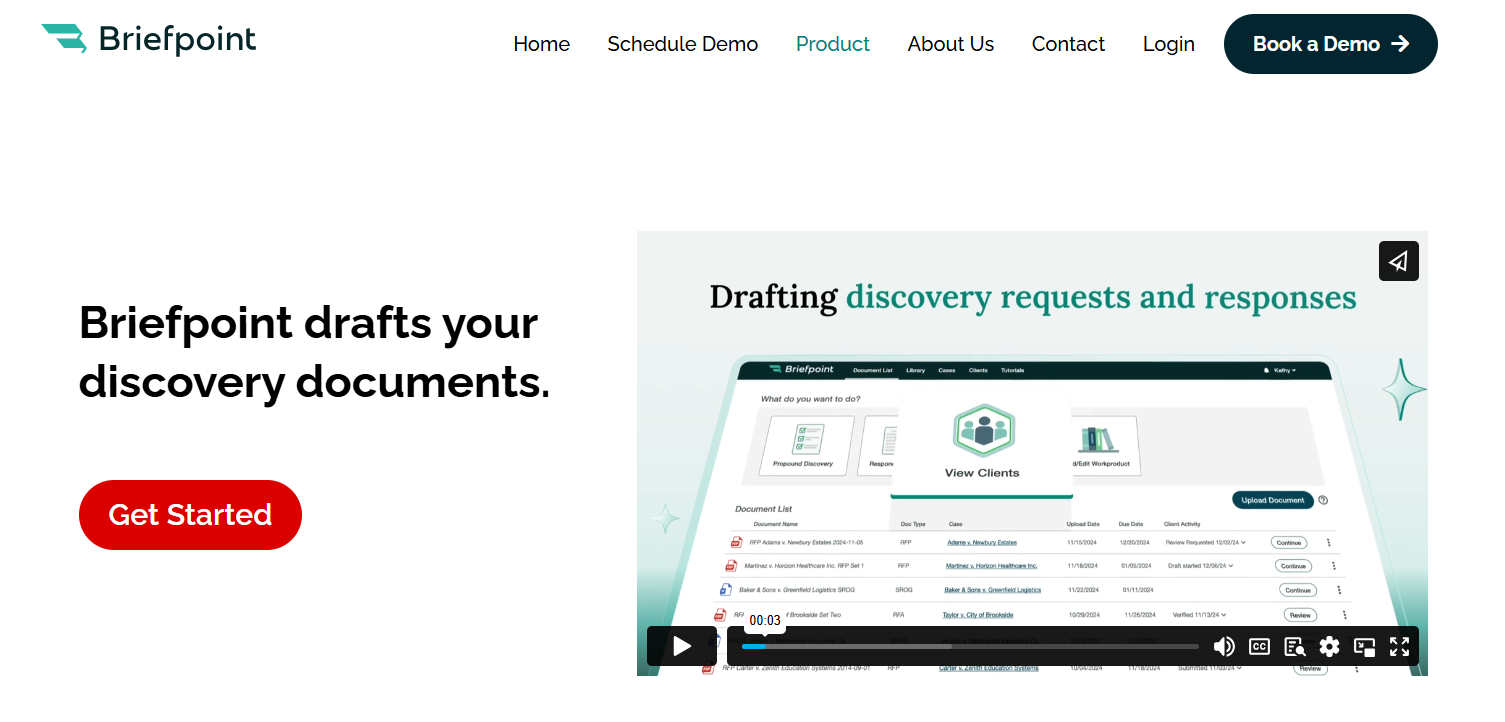
It automatically generates court‑ready drafts, applies proper formatting, and even builds objections, which gives you more time for the parts of your cases that truly need your attention.
With many law firms already using generative AI to speed up litigation tasks, Briefpoint stands out because it’s built specifically for the legal profession.
Upload a complaint to create a propounded discovery or drop in opposing counsel’s requests to produce organized responses in minutes.
Best Features
- Automated discovery drafting: Generates RFAs, RFPs, and interrogatories for all U.S. states and federal districts.
- Objection and response builder: Suggests objections and organizes client responses efficiently.
- Smart court formatting: Applies captions, case numbers, and local formatting rules automatically.
- Workflow integration: Drag‑and‑drop into your CMS and sync deadlines to your calendar.
- Data security: 100% encrypted, with no client data used to train other AI tools.
Pros
- Cuts discovery drafting time by an average of 87%
- Maintains consistency across objections and formatting
- Reduces manual errors and repetitive typing
- Easy for new users to learn quickly
- Frees up hours for client work or strategy
- Provides 24/7 support for busy legal teams
Briefpoint helps you get discovery off your plate faster. Book a demo to see how quickly your team can turn drafts into ready‑to‑serve documents!
2. Clio
Clio is a legal practice management platform designed to make running your firm less stressful. If your desk is full of case files, deadlines, and client emails, Clio keeps everything in one organized space.
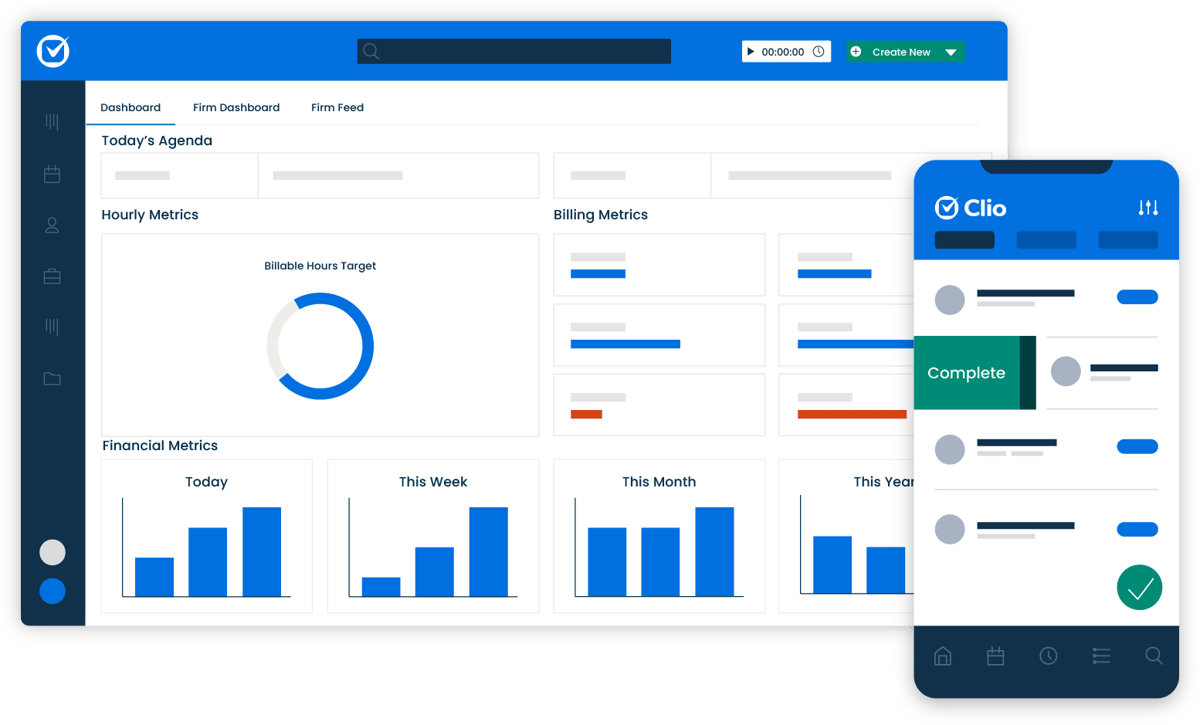
Source: G2
It handles the routine tasks like scheduling, billing, and document storage, while its AI technology helps with legal drafting and workflow automation.
For lawyers looking to boost productivity and keep client communication smooth, Clio is a reliable tool that fits into daily legal services without a steep learning curve.
Best Features
- Case and document management: Stores all client files, deadlines, and case notes in one secure hub.
- AI-assisted document drafting: Speeds up repetitive drafting tasks with smart suggestions.
- Client communication tools: Lets you send updates, schedule meetings, and handle intake securely.
- Time and billing management: Tracks billable hours and generates invoices with ease.
Pros
- Keeps your cases and client interactions organized
- Cuts down time spent on repetitive administrative work
- Makes collaboration easier across your team
- Accessible from desktop or mobile for on‑the‑go work
3. CoCounsel
CoCounsel is an AI software designed to support lawyers with research, drafting, and analysis across different practice groups.
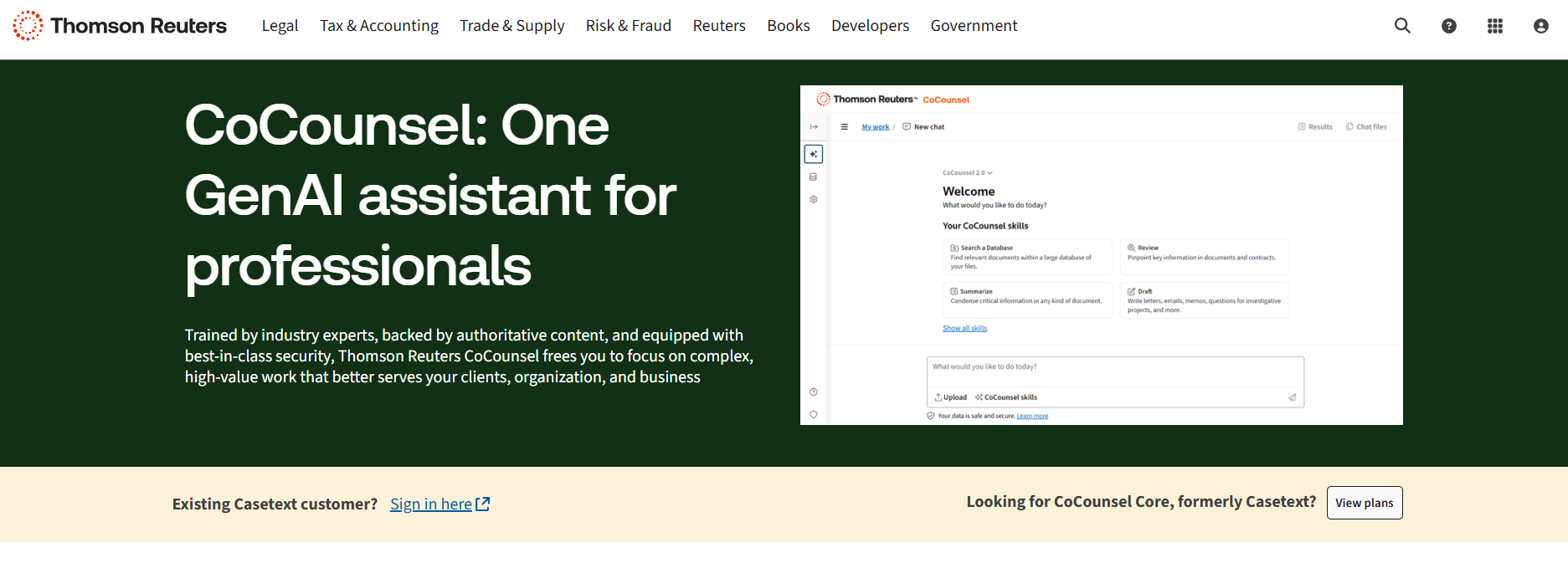
Source: ThomsonReuters.com
If legal work like combing through case law, summarizing complex documents, or preparing early drafts slows your team down, CoCounsel helps you get there faster.
It’s built to boost lawyer productivity by handling routine research and drafting tasks while leaving strategic planning and final judgment to human oversight.
By combining technological advancements with practical workflows, CoCounsel fits into a firm’s daily legal operations without replacing the lawyer’s role.
Best Features
- Rapid legal research: Pulls statutes, case law, and summaries in seconds.
- AI-generated document drafts: Produces first drafts for motions and memos to save time.
- Cross-practice support: Works across multiple practice groups, from litigation to corporate.
- Built-in human oversight: Keeps lawyers in control of every output with easy review and edits.
Pros
- Speeds up research and document prep significantly
- Helps firms allocate more time to client strategy and planning
- Reduces the repetitive, time-consuming side of legal work
- Integrates smoothly with daily workflows in most firms
4. Spellbook
Spellbook focuses on one thing most lawyers deal with constantly: contracts. Reviewing and drafting agreements takes time, especially when you’re handling large volumes or working with standard documents that still need careful attention.
Spellbook brings AI and machine learning into that process to give legal professionals a faster way to spot risks, fill in routine sections, and keep contracts consistent.

Source: Spellbook.Legal
Instead of moving between platforms, Spellbook works directly in Microsoft Word. It highlights clauses that might need review, suggests language you can approve or adjust, and helps reduce the hours spent combing through repetitive text.
Best Features
- Contract risk detection: Flags clauses that could pose problems or require attention.
- Clause and language suggestions: Provides editable text to handle standard documents faster.
- Microsoft Word integration: Lets you review and draft legal documents without leaving your main workspace.
- Machine learning support: Learns from your edits to improve suggestions over time.
Pros
- Cuts down on repetitive contract review
- Supports faster drafting without sacrificing control
- Keeps all work in the tools lawyers already use
- Helps teams stay consistent across multiple agreements
5. Luminance
Luminance is designed for legal teams that deal with vast quantities of legal documents and need a faster way to manage document review.
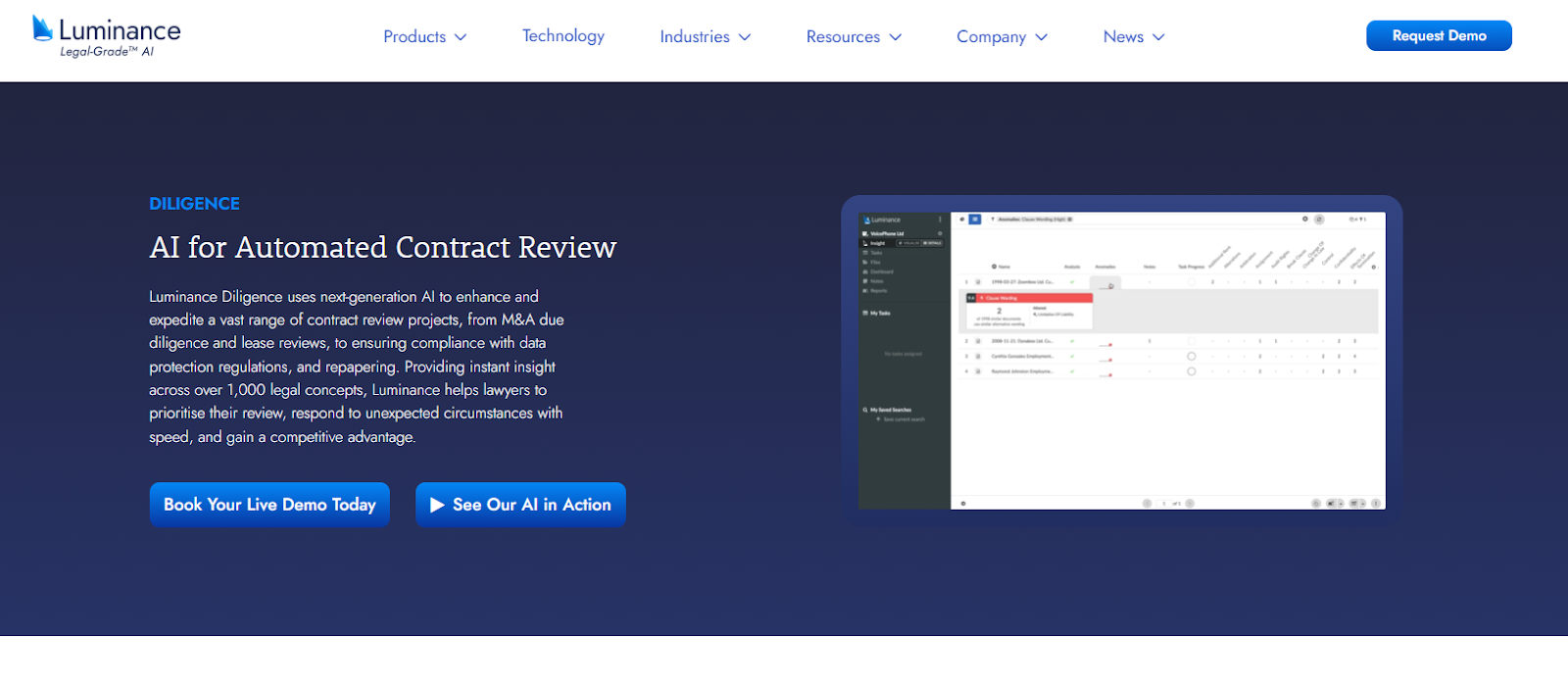
Source: Luminance.com
Combing through contracts, exhibits, and other legal documents for due diligence or compliance can quickly become repetitive and slow down your workflow.
Luminance uses AI systems to identify patterns, highlight key clauses, and organize legal data so you can move through reviews with greater efficiency.
This emerging technology is especially useful during large transactions or investigations where accuracy matters, but time is limited. Rather than manually checking every line, you get clear insights that point you to what needs attention first.
Best Features
- AI-powered document review: Analyzes large volumes of contracts and legal brief materials quickly.
- Key clause detection: Flags unusual or missing terms for faster assessment.
- Legal data organization: Groups related files to simplify due diligence projects.
- Scalable for big cases: Handles vast quantities of files without slowing down your workflow.
Pros
- Speeds up due diligence and large document review projects
- Reduces the most repetitive tasks for legal teams
- Helps identify risks and missing information faster
- Improves efficiency without replacing human oversight
6. Smith.ai
Smith.ai brings new technology to a challenge every firm faces, which is staying on top of client communication. Missed calls or delayed responses can mean lost opportunities, and that’s where a dedicated team paired with AI deployment makes a difference.
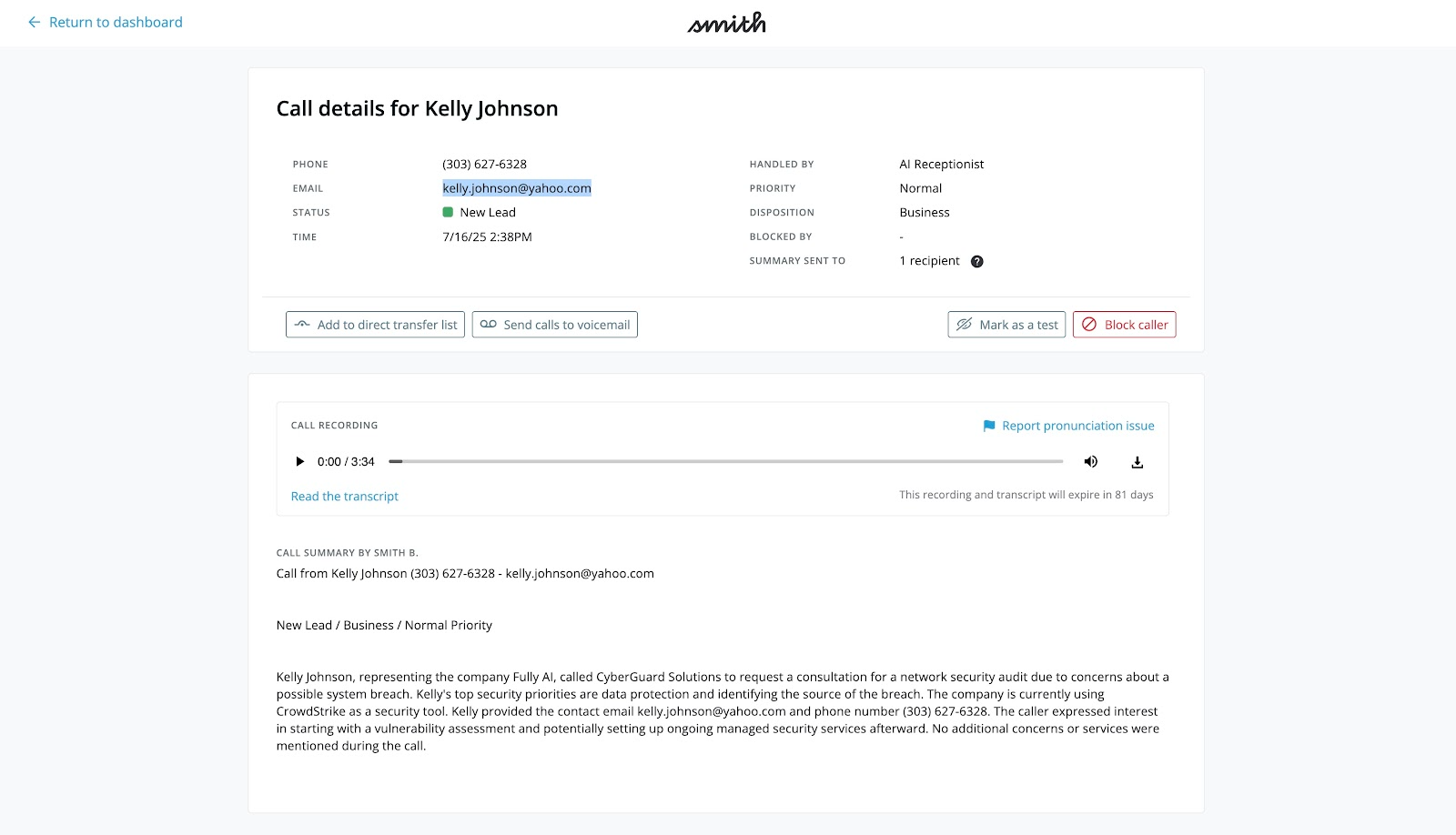
Source: G2
Smith.ai combines live receptionists with AI systems to answer calls, handle website chats, and capture client information around the clock.
For firms in the legal industry, this means no inquiry goes unanswered. Prospective clients get the legal information they’re looking for quickly, and existing clients feel supported without your staff being tied to the phone.
Best Features
- 24/7 virtual receptionist service: Handles calls and chats to capture leads at any time.
- AI-supported intake and screening: Collects and organizes client information for your team.
- Integration with practice tools: Sends details directly into your CRM or case management software.
- Outbound call support: Follows up on leads or reminders without adding to your workload.
Pros
- Keeps firms connected to potential and existing clients day and night
- Reduces interruptions for attorneys and staff
- Makes client intake faster and more consistent
- Useful tool for firms preparing for the future of AI in client communication
7. Everlaw
Everlaw is an eDiscovery and litigation platform that helps law firms and legal departments manage vast amounts of evidence and case material efficiently.
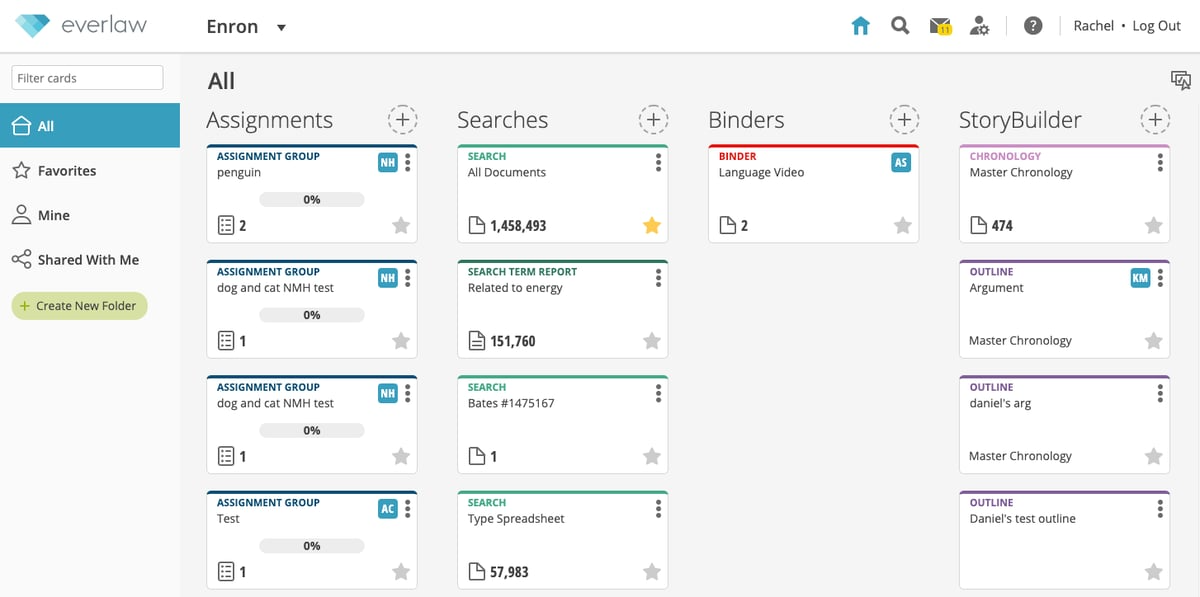
Source: G2
In the legal field, handling documents for tort litigation, investigations, or large corporate cases can be overwhelming without the right tools. But by implementing AI into its workflow, Everlaw turns what used to be a slow, manual review into a more structured and manageable process.
This platform acts as a transformative force for teams aiming for professional excellence while meeting a lawyer’s duty to protect client data. It organizes case files, identifies relevant evidence quickly, and maintains strict data privacy standards.
Best Features
- Advanced eDiscovery review: Filters and analyzes large sets of documents to highlight relevant evidence.
- AI-powered search and tagging: Speeds up finding key details across vast amounts of data.
- Collaboration tools: Lets attorneys, staff, and experts work together securely in one workspace.
- Data privacy and security: Meets strict legal requirements to protect sensitive client material.
Pros
- Handles large, complex litigation processes without slowing your team down
- Speeds up document review and evidence preparation
- Maintains strong data privacy and compliance standards
- Supports lawyers in focusing on strategy over administrative work
Why Briefpoint Leads the Shift in Legal AI
As you can see, AI tools aren’t just conveniences; they’re changing how work gets done in ways that directly affect client service, team efficiency, and a lawyer’s day-to-day life.
That being the case, the firms seeing the most benefit are the ones that pick tools that fit naturally into their workflow and focus on freeing time for higher-value work.

Briefpoint stands out because it solves one of the most time-consuming parts of litigation: discovery drafting.
While other platforms assist with research or document review, Briefpoint gives you back hours by automating the routine parts of propounding and responding to discovery.
It’s a practical step toward adopting AI without losing control of your work product, and it can have a noticeable impact on your team’s schedule and energy.
If saving time on repetitive discovery tasks sounds like a change your firm could use, book a demo today!
FAQs About AI in Law Firms
Will AI take over law firms?
No. AI tools assist with tasks like document review, research, and drafting, but they don’t replace lawyers. Human judgment, strategy, and client relationships remain at the core of legal work.
Is artificial intelligence a threat to lawyers?
AI is more of a support tool than a threat. It handles repetitive tasks, but decisions involving legal strategy, ethical considerations, and client representation still rely on attorneys.
How many law firms are using AI?
Use is growing steadily. Many firms have started with research and document review tools, while larger firms are exploring AI in areas like litigation support, capital markets, and eDiscovery.
Are AI tools safe for handling client information?
Most AI platforms in the legal field are built with privacy and data security in mind. Still, firms should review any tool’s policies to address privacy concerns and confirm it meets their compliance requirements.
Will AI completely replace lawyers in document review?
No. While AI can process and organize vast sets of documents quickly, human oversight is required to confirm accuracy, address nuanced issues, and maintain professional responsibility.
The information provided on this website does not, and is not intended to, constitute legal advice; instead, all information, content, and materials available on this site are for general informational purposes only. Information on this website may not constitute the most up-to-date legal or other information.
This website contains links to other third-party websites. Such links are only for the convenience of the reader, user or browser. Readers of this website should contact their attorney to obtain advice with respect to any particular legal matter. No reader, user, or browser of this site should act or refrain from acting on the basis of information on this site without first seeking legal advice from counsel in the relevant jurisdiction. Only your individual attorney can provide assurances that the information contained herein – and your interpretation of it – is applicable or appropriate to your particular situation. Use of, and access to, this website or any of the links or resources contained within the site do not create an attorney-client relationship between the reader, user, or browser and website authors, contributors, contributing law firms, or committee members and their respective employers.